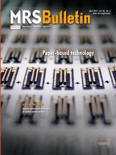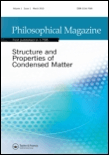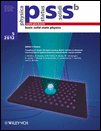
MRS BULLETIN
Scope & Guideline
Connecting Researchers with Pioneering Discoveries.
Introduction
Aims and Scopes
- Advanced Materials Research:
The journal publishes articles on the properties, synthesis, and applications of new materials, including nanomaterials, biomaterials, and energy materials. - Materials Characterization Techniques:
A focus on innovative techniques for characterizing materials at various scales, from atomic to macroscopic, providing insights into their structure and performance. - Sustainable Materials Development:
Research on materials that contribute to sustainability, including recycling, renewable materials, and materials for clean energy technologies. - Interdisciplinary Approaches:
Encouraging collaborative research that integrates materials science with fields such as biology, engineering, physics, and chemistry. - Emerging Technologies:
Exploring cutting-edge technologies such as artificial intelligence, machine learning, and robotics in the context of materials research and development.
Trending and Emerging
- Bioinspired and Biomimetic Materials:
Research exploring materials inspired by biological systems is gaining traction, highlighting innovative applications in healthcare, robotics, and sustainable design. - Quantum Materials and Technologies:
An increasing focus on materials that exhibit quantum phenomena, including topological insulators and quantum dots, as researchers explore their applications in computing and sensing. - Artificial Intelligence and Machine Learning in Materials Science:
The integration of AI and machine learning approaches in materials discovery and design is rapidly growing, facilitating more efficient and innovative research methodologies. - Sustainable and Green Materials:
A strong trend towards the development of materials that promote sustainability, including energy-efficient, biodegradable, and recyclable options, reflecting global environmental concerns. - Flexible and Wearable Electronics:
Research on materials for flexible and wearable electronic devices is on the rise, driven by advancements in personal health monitoring and smart textile technologies.
Declining or Waning
- Traditional Materials Processing Techniques:
There has been a noticeable decrease in publications focusing on conventional materials processing methods, as research shifts towards advanced, automated, and sustainable processes. - Static Analysis of Materials:
Research focusing solely on static properties and behaviors of materials is waning, with a greater emphasis on dynamic and real-time assessments of material performance. - Single-Use Materials:
As sustainability becomes increasingly critical, topics related to single-use or non-recyclable materials are receiving less attention in favor of studies on biodegradable and reusable alternatives. - Basic Mechanical Properties:
While foundational studies are essential, there is a declining trend in papers that focus exclusively on basic mechanical properties without exploring their applications or implications in real-world scenarios.
Similar Journals

PHILOSOPHICAL MAGAZINE
Exploring the Depths of Condensed Matter PhysicsPHILOSOPHICAL MAGAZINE, published by Taylor & Francis Ltd, is a distinguished journal that focuses on the field of Condensed Matter Physics. With an ISSN of 1478-6435 and an E-ISSN of 1478-6443, this journal serves as a vital platform for researchers and professionals seeking to disseminate and access cutting-edge research and developments in the field. Currently ranked in the Q3 category within its discipline according to the 2023 quartiles, and positioned at the 45th percentile in Scopus rankings, PHILOSOPHICAL MAGAZINE is recognized for its significant contributions to theoretical and experimental physics. The journal embraces open access options, enhancing its reach and accessibility to a global audience. With coverage spanning from 2003 through 2024, it remains a cornerstone for scholars and students who aim to deepen their understanding of the complexities within condensed matter systems. For anyone engaged in the physical sciences, PHILOSOPHICAL MAGAZINE offers invaluable insights and fosters an environment of rigorous academic inquiry.

JOURNAL OF MATERIALS SCIENCE
Elevating Understanding in Materials ScienceJOURNAL OF MATERIALS SCIENCE, published by SPRINGER, stands as a highly regarded periodical in the field of materials science, delivering impactful research since its inception in 1966. With an impressive Q1 ranking in both Mechanical Engineering and Mechanics of Materials, alongside strong Q2 positions in Ceramics, Composites, and General Materials Science, this journal serves as a pivotal resource for scholars and practitioners alike. It offers insightful contributions that span a diverse range of topics, from emerging materials to advanced applications in engineering. With a robust Scopus ranking reflecting its global influence—ranking 91 out of 672 in Mechanical Engineering and 63 out of 398 in Mechanics of Materials—the JOURNAL OF MATERIALS SCIENCE maintains an essential role in advancing the understanding and innovation within the discipline. Researchers, professionals, and students are encouraged to access this esteemed journal to keep abreast of groundbreaking findings and methodologies that shape the future of materials science.

ACS Materials Au
Exploring the Frontiers of Materials ScienceACS Materials Au, published by the American Chemical Society, is a premier open-access journal that has been at the forefront of materials science since its inception in 2021. With an ISSN of 2694-2461, this journal encompasses an expansive range of topics including biomaterials, electronic, optical and magnetic materials, materials chemistry, and polymers and plastics, consistently achieving Q1 rankings in these categories for 2023. The journal is based in the United States and operates from the AMS's headquarters in Washington, DC, offering significant visibility and a robust platform for researchers. The journal's commitment to open access ensures wide dissemination of groundbreaking research, enabling a diverse audience—including researchers, professionals, and students—to engage with the latest advancements in materials science. With an encouraging impact factor and a focus on novel materials and innovative applications, ACS Materials Au stands as a vital resource for anyone devoted to understanding and advancing the frontiers of materials engineering and science.

Annual Review of Materials Research
Navigating the Evolving Landscape of MaterialsThe Annual Review of Materials Research, published by ANNUAL REVIEWS, is a pivotal journal in the realm of Materials Science, recognized for its rigorous reviews that bridge the gap between foundational research and advanced applications. With a prestigious ranking of Q1 in the category of General Materials Science and a commendable position at #24 out of 463 in Scopus, it ranks in the 94th percentile among its peers, underscoring its significance and influence in the field. Over the years, from 2003 to 2023, the journal has become an essential resource for researchers, professionals, and students alike, offering comprehensive insights into the evolving landscape of materials science. Although it does not operate under an open access model, its content remains invaluable for advancing knowledge and fostering innovation. The journal’s scope encompasses a wide array of interdisciplinary topics, making it a go-to source for those seeking to stay at the forefront of materials research.

MRS Advances
Exploring Innovations in Condensed Matter PhysicsMRS Advances, published by Springer Heidelberg, is an esteemed academic journal that serves as a vital platform for disseminating cutting-edge research in the fields of condensed matter physics, materials science, and mechanical engineering. With an ISSN of 2731-5894 and an E-ISSN of 2059-8521, the journal is hosted in Switzerland and encompasses an impressive spectrum of innovative studies that impact both theoretical and practical applications. Throughout its converged years from 2012 and continuing through 2024, MRS Advances has established itself with notable rankings, including Q4 in condensed matter physics and Q3 in several related categories. This journal not only enriches the academic community with its rigorous peer-reviewed articles, but also encourages open discussions that further advance research innovations. Although currently not designated as an open-access journal, its accessibility through institutional subscriptions ensures that professionals, researchers, and students can engage with the latest advancements in the material science arena. Emphasizing its relevance, MRS Advances is dedicated to fostering interdisciplinary collaboration and inspiring new discoveries within the global research community.

Materials Today Communications
Empowering Global Collaboration in Materials ChemistryMaterials Today Communications, published by ELSEVIER, stands as a prominent platform within the fields of Materials Chemistry, Materials Science, and Mechanics of Materials. With an open access format, this journal facilitates global dissemination of knowledge, aimed at enhancing collaboration and innovation among researchers, professionals, and students worldwide. Established in 2014 and converging through 2024, the journal has rapidly ascended through the ranks, achieving a commendable Q2 category status in multiple relevant categories. Specifically, its Scopus rankings highlight its influence, with rankings in the 64th to 69th percentile in various materials science domains. A key resource for those engaged in cutting-edge materials research, Materials Today Communications provides insightful coverage of contemporary advancements, bridging the gap between theoretical exploration and practical application.

MATERIALS SCIENCE-POLAND
Connecting Scholars Through Open Access KnowledgeMATERIALS SCIENCE-POLAND, published by SCIENDO, is an esteemed open access journal dedicated to the rapidly evolving field of materials science. Since its inception in 2002 and transitioning to an open access model in 2015, the journal has been a vital platform for researchers and professionals to disseminate their findings and contribute to the scientific community. With an ISSN of 2083-134X and an E-ISSN of 2083-134X, it spans a comprehensive range of disciplines, focusing on condensed matter physics, materials science, and mechanical engineering among others. In the 2023 rankings, it holds a position in the Q4 and Q3 quartiles across various categories, showcasing its relevance and ongoing contribution to these fields. Researchers benefit from its accessibility, enabling wider reach and engagement with contemporary topics in material innovation and applications. As the journal continues to evolve until 2024, it remains a cornerstone for scholars looking to advance their knowledge and research in materials science.

Materials Letters-X
Empowering Global Access to Cutting-Edge ResearchMaterials Letters-X, published by ELSEVIER, is an esteemed open-access journal dedicated to the rapid communication of research in the fields of Condensed Matter Physics, Materials Science, Mechanical Engineering, and Mechanics of Materials. Launched in 2019, this journal has quickly established itself within the academic community, achieving Q3 quartile rankings in several categories according to the 2023 metrics. The journal's impactful contributions are reflected in its Scopus rankings, notably within Mechanical Engineering (Rank #308) and Mechanics of Materials (Rank #199). The open-access model promotes widespread dissemination and accessibility, ensuring that cutting-edge advancements in material science are readily available to researchers, professionals, and students worldwide. As it continues to grow, Materials Letters-X aims to inspire innovation and collaboration across disciplines, making it a pivotal resource for those engaged in material research and applications.

PHYSICA STATUS SOLIDI B-BASIC SOLID STATE PHYSICS
Illuminating Innovations in Basic Solid State ResearchPHYSICA STATUS SOLIDI B-BASIC SOLID STATE PHYSICS, published by Wiley-VCH Verlag GmbH in Germany, is an esteemed journal within the condensed matter physics sphere, covering pivotal advancements in basic solid state physics. With a rich history dating back to 1961, it serves as a scholarly platform for researchers, professionals, and students alike, providing insights into the fundamental properties and applications of electronic, optical, and magnetic materials. The journal currently holds a respectable Q3 ranking in both Condensed Matter Physics and Electronic, Optical, and Magnetic Materials as of 2023, indicating its impactful contributions to these fields despite its competitive landscape. While it does not offer open access, its comprehensive research findings are critical for those engaged in innovative material science research. With a convergence period extending to 2024, PHYSICA STATUS SOLIDI B continues to play a significant role in facilitating knowledge exchange and fostering advancements in solid state physics.

JOURNAL OF ELECTRONIC MATERIALS
Pioneering Discoveries in Electronic, Optical, and Magnetic MaterialsWelcome to the Journal of Electronic Materials, a premier publication in the field of materials science. Published by Springer, this esteemed journal has been a beacon for groundbreaking research in electronic, optical, and magnetic materials since its inception in 1972. As an established resource, it boasts a commendable impact factor and categorically ranks in the second quartile (Q2) in key areas such as Condensed Matter Physics and Electrical and Electronic Engineering, as well as holding a respectable third quartile ranking in fields related to Electronic, Optical, and Magnetic Materials and Materials Chemistry. Researchers, professionals, and students can access a wealth of knowledge as we publish original articles, reviews, and cutting-edge research that push the boundaries of science and technology in these critical fields. Stay informed and engaged as we explore advancements that shape the future of electronic materials.